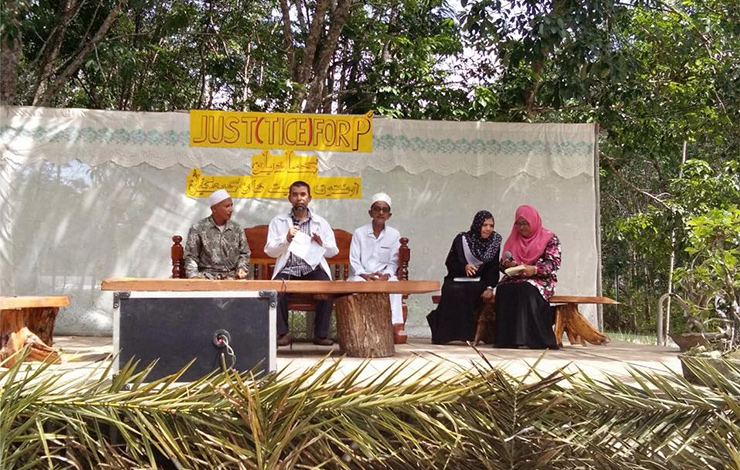Violent conflict in Thailand’s southernmost provinces has led the state to implement special security laws that have resulted in torture and inhumane conditions in detention centers. In order to prevent torture, monitor the treatment of those detained, and increase transparency and accountability, the Cross Cultural Foundation trained civil society organizations and paralegals to monitor detention centers and document human rights abuses.
Challenge

The protracted conflict in the Malay/Muslim-majority southernmost provinces of Thailand constitutes Southeast Asia's most violent internal conflict. Since the conflict was exacerbated in 2004, violence has claimed more than 5,000 lives. The state's strategy is based on the deployment of more than 60,000 security forces and the imposition of three special security laws. Martial law, first imposed in 2004, allows soldiers to detain a suspect without court warrant for up to 7 days. The Emergency Decree, imposed by executive order, allows for up to 30 days of detention without charge in places other than prison. Security forces have used these laws in tandem to hold suspects for up to 37 days without charge. While the practice of torture and the existence of conditions amounting to cruel, inhumane, or degrading treatment has persisted in Thai detention centers and prisons in general, the situation in the southernmost provinces by the impositon of special security laws has worsened this trend. The National Human Rights Commission (NHRC) only conducts sporadic visits to detention facilities, and often is denied access. At the same time, local civil society organizations (CSOs) have not yet established an efficient system of detention monitoring in order to ensure compliance with international human rights standards in the detention facilities of southern Thailand. CSOs lack the capacities and training to visit detention centers on a regular and systematic basis in order to monitor the situation of the detainees and document and report cases of torture or ill treatment. In order to prevent torture and ill treatment in detention facilities and to protect those who have become victims of torture from further human rights abuses, it is crucial that local CSOs can act as a watchdog on behalf of the civil society.
Program Summary
The project will be built on five pillars. The first two pillars will deal directly with training and capacity building for local CSOs, in order to enable them to monitor places of detention. The third and fourth pillars will include visits to detention facilities. Monitoring the treatment and conditions of detention of persons deprived of their liberty through unannounced and regular visits is one of the most effective means of preventing torture and ill-treatment. Last but not least, under the fifth pillar, information collected during the visits will be compiled and utilized for reporting to international human rights bodies, as well as for submitting policy recommendations to state agencies. Key activities of the project include:
- Paralegal manual on detention facility monitoring: Produce a paralegal manual on detention facility monitoring in collaboration with the Association for the Prevention of Torture (APT) and Muslim Attorney Center Foundation (MAC)
- Capacity building: Conduct two workshops for paralegals working under MAC on detention facility monitoring skills, human rights abuse detection and forensic knowledge
- Torture prevention and protection: Trained paralegals will conduct 20 regular monitoring trips to detention facilities in the four southernmost provinces to ensure compliance with international human rights standards and document the condition of the facilities and the situation of the detainees
- Documentation, research and reporting: Cross Cultural Foundation, in collaboration with MAC will compile factsheets in order to document the situation in detention centers in the Deep South and highlight human rights abuses by the security forces and prison guards
Impact
- Intermediate beneficiaries of this project are paralegals working for local human rights CSOs in the southernmost provinces of Thailand. Paralegals will be trained in detention-facility monitoring, human rights abuse detection and forensic knowledge (incl. CAT and Istanbul Protocol). Thus local human rights CSOs will be empowered to act as detention watchdogs on behalf of the civil society of the southernmost provinces.
- The final beneficiaries will be prisoners and persons held in pre-trial detention in the prisons and detention facilities of the southernmost provinces of Thailand. The watchdog function of well-trained paralegals of local CSOs will provide prevention and protection from ill-treatment and torture for prisoners and detainees.
- The project will have an impact on the protection of fundamental rights established by international law, in specific the right to life and security of the person (WJP Rule of Law Index Subfactor 4.2). As embodied in Article 5 of the UDHR: "no one shall be subjected to torture or to cruel, inhuman or degrading treatment or punishment". The dissemination of credible information will help to raise the pressure on the government and relevant agencies to modify their policies in respect to the rule of law and human rights.
Partners
Partners include:
- The Association for the Prevention of Torture; and
- The Muslim Attorney Center Foundation

